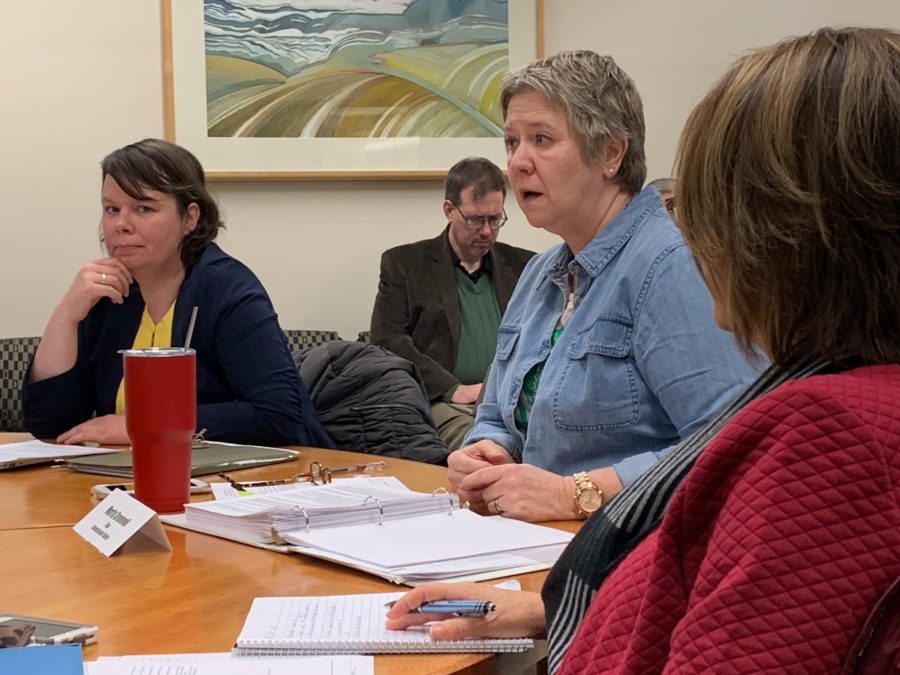CAA OKs new course, tables online course policy change
Logan Raschke | The Daily Eastern News
Marita Gronnvoll, council on academic affairs chair and communication studies professor, addresses CAA during its Thursday meeting. CAA voted to approve a new history capstone worth one credit and to table an online course policy revision.
November 15, 2019
The Council on Academic Affairs voted Thursday to approve HIS 4377: Professional Development Capstone for Departmental Honors Students as a new course and table an online course policy revision.
The history capstone is taken by all history majors excluding honors students because they are in a different program. The rationale for having the new course was to give honors students the professional developments elements that history students get in the history capstone.
The proposed online course policy revision would require all professors who would teach online courses to submit proof of them completing online course development training activity before the online class would start, according to the proposal.
All proposed online courses that included “online” as a mode of delivery would need to ensure student learning by answering questions. Additionally, all online classes at or above the 5000 level or between 4750 to 4999 that keep the course content and learning objectives the same would need to get sent to CAA and the Council on Graduate Studies.
Jason Hood, assistant vice president of academic affairs, said the rationale for the proposal would be to get qualified professors to teach online courses without having to take the training.
“The intent is not to say that no (professor) ever has to do it,” Hood said. “The intent is to say that if in fact the chair and the dean believe that particular individual has the experience to teach an online course without going through our current requirements, then they should have the ability to say that’s OK.”
Claudia Janssen Danyi, vice chair and public relations professor, said a provision in the contract that professors who want to teach online classes for the first time must sign governs what happens.
Billy Hung, councilmember and biology professor, said he was concerned about the potential conflict in language between the contract and the proposal.
“In that language, as I remember, we make no distinction in the amount of prior experience in teaching,” he said. “The language seems to be in conflict with the CBA language in some specific cases. I think this language as it is written without exceptions or clarifications is problematic.”
Marita Gronnvoll, chair and communication studies professor, said the provost’s office will likely revisit the policy, work to make language more specific and receive feedback from CAA on how to do that most effectively.
CAA also mentioned the Oct. 26, 1978 CAA minutes which indicated that “a minor in other than teacher certification programs may be obtained by successfully completing a minimum of 18 semester hours, of which at least six hours are in courses numbered 3000 or above.” The noted exception is intended for business majors.
Gronnvoll said even though CAA minutes indicated that the minimum credit hours for minors would need to be 18 back in 1978, CAA approved two minors last year: social media engagement (16 credit hours) and meeting and event management (15 credit hours). She said no further action would be taken for those two minors CAA already approved last year.
Gronnvoll said the question is whether that statement should be made a formal policy.
She said she will update the CAA handbook, and including a formal policy requiring an 18-credit-hour minimum for minors would make sense.
CAA also discussed a proposed bylaw change regarding the Open Meetings Act.
Danyi said the council’s recommendation to adjust the bylaws in order to remain transparent and “act in the spirit of the Open Meetings Act” was the idea behind the discussion item.
Gronnvoll said the issue was that CAA was not compliant with the Open Meetings Act because agendas must be published physically, but CAA only does this electronically.
Additionally, the Open Meetings Act prohibits adding items to agendas and voting on them at the same meeting, but CAA has done that as well, she said.
“Our bylaws give us that provision, but open meetings does not,” Gronnvoll said. “So when we make this change to our bylaws, our bylaws will be consistent because they’re not right now. So we’ll still operate in the spirit of open meetings, but now at least we’ll be doing what our bylaws say we’re going to be doing.”
The proposed bylaw change Gronnvoll addressed was a discussion item, and no action was taken.
Logan Raschke can be reached at 581-2812 or at [email protected].



















































